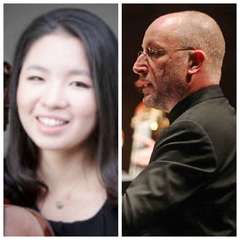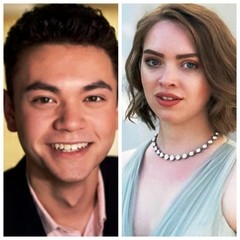|
Back
Pinpoint Songlets, Percussive Landscapes New York
Alice Tully Hall, Starr Theater
11/01/2019 -
Igor Stravinsky: Three Pieces for Solo Clarinet – Three Japanese Lyrics – Elégie for Solo Viola – Pribaoutki
Tōru Takemitsu: Archipelago S.
Harrison Birtwistle: Silbury Air
Libby Sokolowski (Soprano), Kyle Miller (Baritone), Hanlin Chen (Clarinet), Lisa Sung (Viola)
AXIOM Ensemble, Jeffrey Milarsky (Conductor)

L. Sung/J. Milarsky
“It’s the irrational things that interest me.”
Harrison Birtwistle (1934- )
“I always want to write erotic music... Not only about the love between men and women, but in a much more universal sense - about the sensuality of the mechanism of the universe... about life.”
Tōru Takemitsu (1930-1996)
Two words describe last night’s AXIOM concert: “Who knew?”
Who knew that Igor Stravinsky had written an emotional piece for solo viola? Who knew that a Takemitsu recording had nothing to do with an ensemble that would be spread in every corner of a stage–with a few musicians up in the balcony? Or that Stravinsky had written a jokey song so short that a Webern bagatelle would have Brucknerian dimensions in comparison?
When one goes to an AXIOM concert, conducted with the clean strokes of Jeffrey Milarsky, one invariably encounters the sound of surprise. His musicians are frequently students or grads from Juilliard, but they are always the best. Even better for us benighted scribblers, the music is so new that we don’t need to compare previous performances. We can simply sit back in Alice Tully Hall and feel these artists stating their state-of-their-art.
Last night began with a startling factoid–and a splendid solo clarinet performance. In the inclusive program notes by Matthew Mendez, we learned that Igor Stravinsky had met Sydney Bechet, the great soprano-sax artist (and perhaps the first African-American who had emigrated to Paris). And that he had employed a kind of jazz in the second movement, long before his insipid Ebony Concerto.
Hanlin Chen played the tranquil first movement softly, the few grace notes and leaps taken with deftness. But the jazzy second movement (also with the alto clarinet) was like a mad improvisation. Mr. Chen handled what sounded like a flurry of 32nd notes (maybe even 64th notes!) without undue haste, but with a technical fury. It sounded nothing like Bechet, or even jazz, but it was a marvelous exhibition. As was the final movement., syncopated, fairly loud, complex and ending with a quiet shock, one of those early grace notes!
The other Stravinsky soloist was equally dynamic in a work which showed the supposedly emotionless “late” Stravinsky in an Elegy for solo viola. The performer, Lisa Sung, played this very sensitive work almost entirely with double-stopping for a contrapuntal, Baroque feeling. Ms. Sung played the two bookend movements (the end a near mirror of the first) with lovely feeling. Yet in the middle fugue, she broke free of any elegiac restrictions, almost shouting out the counterpoint, her solo instrument becoming a near orchestra in itself.
It was a stunning performance for a work totally unknown to this scribe.

K. Miller/L. Sokolowski
The vocalists for a pair of Stravinsky rarities were also exceptional, though their offerings were all too short. Libby Sokolowski sung Three Japanese Lyrics, with Mr. Milarsky leading a chamber orchestra. The three “spring poems” didn’t have the slightest relation to the composers “rites of spring.” Those were barbaric: these poems celebrated spring with idyllic pleasantries.
That made no difference to the composer, who simply wanted to set syllables to music. The singer was articulate, lyrical, confident. And while hardly seasonable, they were terrific bagatelles.
Those minute-long works were gigantic compared to Kyle Miller’s second of Stravinsky’s “joking songs”. I have no watch, but this seemed to last about 15 gorgeous seconds. What got me about this stunning young baritone was not his clarity (each Russian syllable so clear) or his splendid voice. But that he managed to actually present a Russian sound, a Slavic euphony to his voice. That, as much as the aphoristic melodies, made this such an enchanting experience.
As for the AXIOM ensemble itself, they showed their best in works of Takemitsu and Birtwistle.
I had heard Takemitsu’s Archipelago S. for 21 Players before, when played live in the Met Museum several years ago. The sounds were fine–but the composer required spatial ensembles, and the Met performance was played with simple orchestral seatings.
Here, two groups were facing each other across a stage, one group in the facing Mr. Milarsky with clarinets in the balcony. These were “islands” (the “S” stood for Stockholm, Seattle or Seto Islands), and the sounds resounded over each other with the most fragile Japanese woodcut tones.
One question: Takemitsu always revered Debussy, and a few of the motifs here seemed like repetitions from La Mer. Was the composer giving homage? Or is there something in the genetic codes of water which produce these tones?
The final work was slam-bang Harrison Birtwistle, his Silbury Air totally unknown to this writer previously. Obviously the inspiration of an ancient man-made hill would not bring forth bucolic Vaughan Williams tones. Instead, Mr. Birtwistle has always looked for the magic, the cryptic, the supernatural–and here he found it in a work of sheer percussive power. The piano was percussive, the vibraphone (or xylophone; I couldn’t see it) was percussive, the strings and brass drummed out their blocks of percussive notes, even the harp drummed out her notes, from first to her final chords.
At sixteen minutes, Silbury Hill was not only the longest work, but the most magnetic. Mr. Milarsky conducted not furiously but minimally.
With mainly young musicians of this talent, Mr. Birtwistle’s notes were sufficient for a spectacular finale.
Harry Rolnick
|